Entrepreneurial Ecosystems: A Transnational Migration Studies Approach
In recent years, the ecosystem framework has emerged as a new concept for the study of innovation, entrepreneurial activities, and economic development. It has been adopted by business and entrepreneurship scholars who deploy the analytic concept to refer to the different actors involved in the entrepreneurship process, ranging from individual entrepreneurs to organizations supporting founders and entrepreneurial activities to institutions making policies that impact innovation. Yet what has not been theorized or studied sufficiently are how such ecosystems emerge relationally in a transnational fashion such that entrepreneurial ecosystems and innovation activities need to be understood within a broader transnational mobility context.
A transnational migration studies (TMS) approach allows multiscalar consideration of how individual entrepreneurs, entrepreneur support/resource organizations, and institutionalizing forces across different nations, such as innovation policies, economic development plans, or entrepreneurship laws, take shape in relation to each other across time and space. Based on these considerations, my research aims to reconceptualize entrepreneurial ecosystems through a transnational perspective as relational, multiscalar identity-driven formations made up of people, organizations, and nations among other actors and elements.
At the scale of individuals, the TMS framework provides a way to examine and showcase the contours of transnational social fields embodied by different founders who engage in entrepreneurship transnationally, their ever evolving identities, and the various entrepreneurial practices they enact. The specific question guiding my focus on founders is: How do founders traversing across different cities engage in entrepreneurial efforts that transcend national boundaries and how do they understand their own identities as transnational individuals in different cultural contexts?
At the scale of organizations, I adopt a case study approach and focus on the Cambridge Innovation Center, an innovation-focused organization with a global footprint, aiming to bring inclusive economic development through innovation and entrepreneurship activities to different cities and nations. The specific question for the case study is: How does the Cambridge Innovation Center engage in identity formation across different entrepreneurial ecosystems and create connectivity among people, places and cultural practices?
Finally, by demonstrating the historic and contemporary linkages between and among ecosystems across time, space, and place, I focus on different nations as they engage in the creation and implementation of innovation and entrepreneurship policies. Specifically, I focus on the U.S., Switzerland, the UAE, Israel, and Taiwan as nations with distinct histories, policies, and practices related to participation in the global innovation economy. The specific question for the study of nations is: How do different nations engage in institution building to support innovation and start-ups and how do their actions and policies give rise to transnational entrepreneurial ecosystems?
Taken together, these three areas provide the foundation for understanding the transnational aspects of entrepreneurial ecosystems by focusing on founders, organizations, and institutional efforts by nation-states to support innovation and entrepreneurship.
Banu Ozkazanc-Pan

Banu Ozkazanc-Pan, Ph.D., is the Barrett Hazeltine Professor of the Practice of Engineering at the School of Engineering and the Founder and Director of the Venture Capital Inclusion Lab at the Nelson Center for Entrepreneurship at Brown University. Banu’s research focuses on culture and inclusion in venture capital and innovation ecosystems. She is a prolific academic researcher and scholar, placing among the top 2% of scientists globally. Based on her expertise, Banu was invited to provide testimony on women and minority investors and entrepreneurs at the U.S. Senate Committee on Small Business & Entrepreneurship hearing on SBIC program reauthorization and has been a speaker on topics related to inclusion and innovation at the Harvard Business School, Brookings Institution, and Oxford University, among others. Banu contributed her expertise to a Brookings Institution publication on why the CHIPS and Science Act won’t build inclusive innovation ecosystems on its own. She is currently a member of CNBC’s Disruptor 50 Advisory Council and a new Board Member at AI4All, an award-winning national nonprofit that elevates promising undergraduate talent into impactful AI roles. Her current research projects include examining the backlash to DEI, digital plantations, and the ethical, environmental, and legal challenges in the AI industry. Banu earned her Ph.D. in Organization Studies from the Isenberg School of Management at the University of Massachusetts – Amherst.
